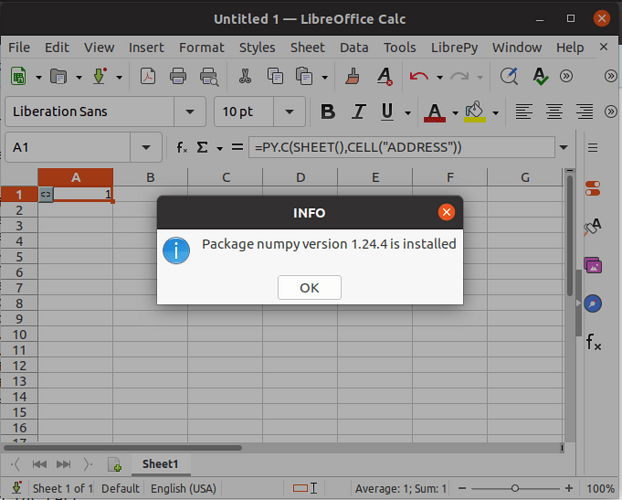OK, first I fulfill distutils, then I install pip:
pip3 install numpy --user --upgrade --break-system-packages
Requirement already satisfied: numpy in ./.local/lib/python3.8/site-packages (1.24.4)
Start Calc, click the Pythonista icon and get the exact same results as before. The button inserts =PY.C(SHEET();CELL("ADDRESS")) returning Err504, none of the menu commands does anything, except “Debug Log Module”, which dumps to the console:
2024-10-05 13:40:08,923 - ERROR - PyModule: Error initializing module
Traceback (most recent call last):
File "/home/andreas/.config/libreoffice/4/user/uno_packages/cache/uno_packages/lu33326dm92w.tmp_/LibrePythonista(1).oxt/pythonpath/libre_pythonista_lib/code/py_module.py", line 71, in _init_mod
exec(code, self.mod.__dict__)
File "<string>", line 3, in <module>
File "/opt/libreoffice24.2/program/uno.py", line 346, in _uno_import
return _builtin_import(name, *optargs, **kwargs)
File "/home/andreas/.local/lib/python3.8/site-packages/matplotlib/__init__.py", line 124, in <module>
import numpy
File "/opt/libreoffice24.2/program/uno.py", line 346, in _uno_import
return _builtin_import(name, *optargs, **kwargs)
File "/home/andreas/.local/lib/python3.8/site-packages/numpy/__init__.py", line 141, in <module>
from . import core
File "/opt/libreoffice24.2/program/uno.py", line 425, in _uno_import
raise uno_import_exc
File "/opt/libreoffice24.2/program/uno.py", line 346, in _uno_import
return _builtin_import(name, *optargs, **kwargs)
File "/home/andreas/.local/lib/python3.8/site-packages/numpy/core/__init__.py", line 49, in <module>
raise ImportError(msg)
ImportError:
IMPORTANT: PLEASE READ THIS FOR ADVICE ON HOW TO SOLVE THIS ISSUE!
Importing the numpy C-extensions failed. This error can happen for
many reasons, often due to issues with your setup or how NumPy was
installed.
We have compiled some common reasons and troubleshooting tips at:
https://numpy.org/devdocs/user/troubleshooting-importerror.html
Please note and check the following:
* The Python version is: Python3.8 from "/usr/bin/python3"
* The NumPy version is: "1.24.4"
and make sure that they are the versions you expect.
Please carefully study the documentation linked above for further help.
Original error was: No module named 'numpy.core._multiarray_umath' (or 'numpy.core._multiarray_umath.add_docstring' is unknown)
(or '.core' is unknown)

